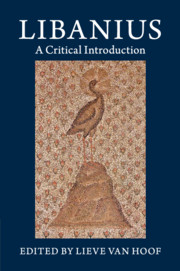Book contents
- Frontmatter
- Dedication
- Contents
- List of tables
- Notes on contributors
- Preface
- Abbreviations
- Introduction: Libanius at the margins
- Part I Reading Libanius
- Part II Libanius’ texts: rhetoric, self-presentation and reception
- Chapter 4 Libanius’ Orations
- Chapter 5 Libanius’ Declamations
- Chapter 6 Libanius’ Progymnasmata
- Chapter 7 Libanius’ Letters
- Chapter 8 The reception of Libanius: from pagan friend of Julian to (almost) Christian saint and back
- Part III Contexts: identity, society, tradition
- Appendices: survey of Libanius’ works and of available translations
- References
- Index locorum
- General index
Chapter 6 - Libanius’ Progymnasmata
from Part II - Libanius’ texts: rhetoric, self-presentation and reception
Published online by Cambridge University Press: 05 October 2014
- Frontmatter
- Dedication
- Contents
- List of tables
- Notes on contributors
- Preface
- Abbreviations
- Introduction: Libanius at the margins
- Part I Reading Libanius
- Part II Libanius’ texts: rhetoric, self-presentation and reception
- Chapter 4 Libanius’ Orations
- Chapter 5 Libanius’ Declamations
- Chapter 6 Libanius’ Progymnasmata
- Chapter 7 Libanius’ Letters
- Chapter 8 The reception of Libanius: from pagan friend of Julian to (almost) Christian saint and back
- Part III Contexts: identity, society, tradition
- Appendices: survey of Libanius’ works and of available translations
- References
- Index locorum
- General index
Summary
Introduction
From the late Hellenistic period to Late Antiquity and beyond, elite young men in the Greek and Roman worlds studied a literary-rhetorical curriculum consisting of learning to read and interpret classical poetry and prose, composing their own brief prose texts, and composing and delivering declamations (meletai), fictional judicial speeches in which they impersonated mythological, historical or stereotyped characters. They learned prose composition primarily through the progymnasmata, or ‘preliminary exercises,’ which prepared them for the more advanced study of stasis theory (a method of determining precisely what is at issue in a case and constructing one’s speech accordingly) and declamation. Although their number and sequence varied, the progymnasmata consisted of up to fourteen exercises, generally proceeding from simpler to more complex tasks: fable (mythos), narration (diēgēma), anecdote (chreia), maxim (gnōmē), refutation (anaskeuē), confirmation (kataskeuē), common topics (koinos topos), encomium (enkōmion), invective (psogos), comparison (synkrisis), speech in character (ēthopoiia), description (ekphrasis), thesis (thesis) and introduction of a law (eisphora tou nomou). These progymnasmata not only show us how written composition was taught in the Greek-speaking world for more than a thousand years, but also illustrate one important method by which each successive generation of the elite became ‘completely educated’ (pepaideumenoi).
Information
- Type
- Chapter
- Information
- LibaniusA Critical Introduction, pp. 128 - 143Publisher: Cambridge University PressPrint publication year: 2014
Accessibility standard: Unknown
Why this information is here
This section outlines the accessibility features of this content - including support for screen readers, full keyboard navigation and high-contrast display options. This may not be relevant for you.Accessibility Information
- 5
- Cited by
